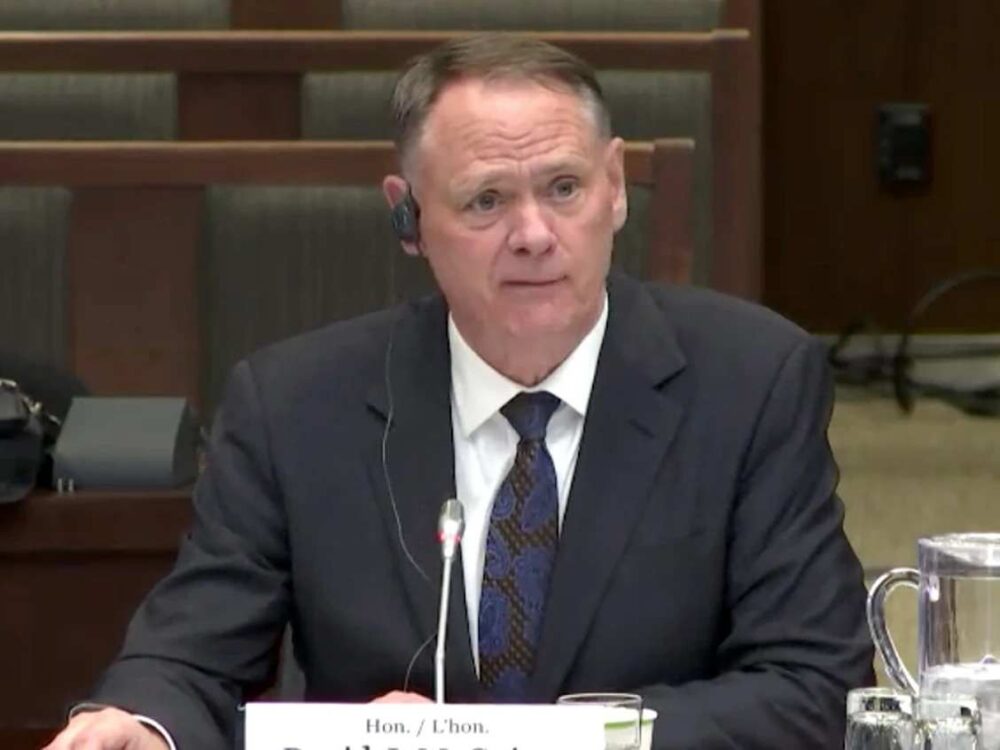
MP David McGuinty, chair of the National Security and Intelligence Committee of Parliamentarians, appears before the House of Commons national security committee on April 18, 2023 (Screen shot, ParlVU)
Some Canadian parliamentarians are “witting” participants in interference efforts by foreign powers, says a committee of parliamentarians that oversees national security.
Examples of such efforts, the report says, include having frequent communication with foreign missions before or during elections to get support from community groups or businesses, “which the diplomatic missions promise to quietly mobilize in a candidate’s favour,” as well as “knowingly or through willful blindness” accepting funds from foreign diplomatic posts or their proxies.
Other examples include providing foreign diplomatic officials with confidential information on other parliamentarians, “knowing that such information will be used by those officials to inappropriately pressure Parliamentarians to change their positions.”
The report does not name any of the implicated MPs or senators.
In some cases, the compromised parliamentarians make efforts to “improperly influence” their colleagues at the direction of foreign officials, and provide confidential information to intelligence officers of a foreign state, says the report, which was submitted to Prime Minister Justin Trudeau on March 22 ahead of its public release.
It notes that some politicians begin helping foreign officials soon after assuming office.
“In some cases, parliamentarians were unaware they were the target of foreign interference,” the partly redacted report said. “Some elected officials, however, began wittingly assisting foreign state actors soon after their election.”
Although some of those activities are illegal, the report says no prosecution is likely going to take place due to Canada’s inadequate approach to the issue.
“These are particularly concerning examples of behaviour by a few Parliamentarians. Some may be illegal, but are unlikely to lead to criminal charges, owing to Canada’s failure to address the long-standing issue of protecting classified information and methods in judicial processes,” the report said.
The report notes that the People’s Republic of China (PRC) remains the largest foreign interference threat to Canada and its democratic institutions.
“The PRC’s foreign interference efforts continue to be sophisticated, persistent and multi-dimensional, targeting all orders of Canadian government and various facets of society and relying upon a number of methods,” the report said.
The other most significant foreign interference threats to Canada, according to the report, are India and Russia, although the latter did not engage in Canadian democratic institutions and processes.
‘Transnational Repression’
The report notes China’s operation of secret police stations on Canadian soil without permission and the observation by the Canadian Security Intelligence Service (CSIS) that the stations’ main purpose is to collect intelligence and monitor diaspora members in Canada.
It adds that the United States, upon finding out about such overseas stations on its soil, charged the individuals involved under an offence that doesn’t exist in Canada where there isn’t yet a foreign agent registry. No charges have been laid so far in relation to Chinese police stations as of this time, the report notes.
Government ‘Slow’ to Respond
The committee also said the government has been slow to respond to the issue of foreign interference.
“The slow response to a known threat was a serious failure and one from which Canada may feel the consequences for years to come,” the report said.
“The implications of this inaction include the undermining of the democratic rights and fundamental freedoms of Canadians, the integrity and credibility of Canada’s parliamentary process, and public trust in the policy decisions made by the government. Canada is only now beginning to see the introduction of additional measures to address foreign interference activities.”
The report says the government has to act quickly to remove any obstacles in the way of “effective leadership” in countering foreign interference, including enacting new legislative tools.
“The Committee underscores that briefing Parliamentarians on the threat is imperative,” the report said.
Minister of Public Safety Dominic LeBlanc said although his government welcomes the report and will consider its recommendations, he disagrees with some of its findings.
“Much work has been done over the last number of years to further strengthen Canada’s safeguards against foreign interference, and these reports will help further inform and bolster these efforts,” Mr. LeBlanc said.